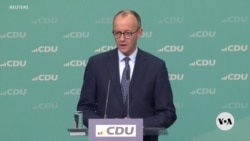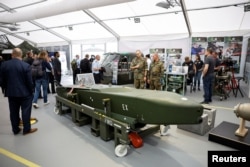Germany’s likely next chancellor has warned that the United States cares little about Europe’s fate and has called for the continent to urgently organize its own defense capabilities, marking a profound shift in approach from Europe’s biggest economy.
“I would never have thought that I would have to say something like this in a TV show. But after Donald Trump's remarks last week, it is clear that the Americans — or in any case, the Americans in this administration — do not care much about the fate of Europe,” Friedrich Merz said in a post-election televised debate after his Christian Democrats, or CDU Party, won 28.5% of the vote in Sunday’s election, 8% ahead of the second place Alternative for Germany Party, or AfD.
“My absolute priority will be to strengthen Europe as quickly as possible so that step by step, we can really achieve independence from the USA,” added Merz.
He said the NATO summit in June could be a defining moment, adding that it’s unknown whether allies “would still be talking about NATO in its current form or whether we will have to establish an independent European defense capability much more quickly.”
Ukraine support
Until now, Germany has been the second-biggest donor of military aid to Ukraine, after the United States. Merz may seek to boost that support, according to Liana Fix of the Washington-based Council on Foreign Relations.
“Friedrich Merz has spoken in favor of Ukraine's victory. In general, he has adopted a more hawkish position than [outgoing Chancellor] Olaf Scholz had. He advocated for German long-range missile deliveries to Ukraine, the Taurus. He made clear that support for Ukraine will have to continue, even if a ceasefire deal is reached,” Fix told VOA.
Merz’s election victory came on the eve of the third anniversary of Russia’s full-scale invasion of Ukraine.
The Brandenburg Gate, once the frontier between east and west Berlin during the Cold War, was lit up Monday in the Ukrainian national colors to mark the anniversary.
The potential threat from Moscow loomed heavy over the German election. Berlin resident Juergen Harke, who was among those attending a pro-Ukrainian demonstration outside the Russian Embassy, said it was vital that Merz remains true to his word.
“I hope that the new government will continue to supply weapons to Ukraine, that it will work together with the European states to develop a major counterweight to Russia — and now also to Trump,” Harke told Reuters.
Shifts in US policy
Trump has engineered a dramatic change in U.S. policy toward Ukraine and its defense against the Russian invasion. Last week, he falsely blamed Kyiv for starting the war and labeled Ukrainian President Volodymyr Zelenskyy a “dictator.”
On Monday, the U.S. joined Russia in voting against a European-backed resolution at the United Nations Security Council which blamed Moscow for the war and called for an immediate withdrawal of Russian troops from Ukraine.
Monday on his social media platform Truth Social, Trump congratulated Merz on his victory.
“Looks like the conservative party in Germany has won the very big and highly anticipated election. Much like the USA, the people of Germany got tired of the no common sense agenda, especially on energy and immigration that has prevailed for so many years,” Trump wrote, using all capital letters.
Russia, meanwhile, said it would wait to see how relations with the new German chancellor play out.
“Each time we want to hope for a more sober approach to reality, for a more sober approach to what could be issues of mutual interest [between Russia and Germany] and mutual benefits. But let's see how it will be in reality,” Kremlin spokesperson Dmitry Peskov told reporters on Monday.
Europe defense
The sudden reversal in U.S. foreign policy has shocked Europe, said analyst Mattia Nelles, founder of the German-Ukrainian Bureau, a policy consultancy based in Dusseldorf.
“We are, as Germany, shocked and utterly unprepared for the end of the Pax Americana, the end of America providing security for Europe. And we now find ourselves in a difficult position to organize the transition away from U.S. being the leading provider of security to a more European-driven approach — not just to Ukraine, but to organizing our own self-defense,” Nelles told VOA.
“And that’s a huge effort. It’s going to require a lot of political will,” he said. “But Merz has said he's willing to lead on that, and let's see whether we are able to step up.”
Can Europe afford to pay for its own defense?
“Merz can agree to joint debt on the European level, which the conservatives always hated,” Fix of the Council on Foreign Relations said.
Europe is currently holding around $200 billion of Russian state assets, which were frozen following the invasion.
Merz “can agree to seizing Russian frozen assets, which has not been done so far but should be done soon before Hungary vetoes. He has talked about the U.K. and France having to extend the nuclear umbrella to Germany as a possible pathway,” Fix added.
German debt
In the election campaign, Merz supported maintaining Germany’s so-called "debt brake," which limits annual government borrowing to only 0.35% of the country’s gross domestic product.
Germany’s budget deficit is among the lowest in the G7 group of nations, although critics say the policy blocks critical investment. Merz has hinted that the debt brake may be eased to boost defense spending.
“Given the challenges at hand, we're looking at the reform of the so-called debt brake, and that requires constitutional amendments, for which there is not a majority of the centrist parties in parliament,” Nelles noted.
The Christian Democrats are well short of a majority, but Merz has ruled out forming a coalition with the far-right AfD.
Far-right firewall
The so-called “firewall” around the AfD, whereby German centrist parties have refused to rely on parliamentary votes or to enter any coalition with the far right, has been strongly criticized by Washington.
Alice Weidel, co-leader of the AfD, echoed those concerns.
“We consider this blockade to be undemocratic. You cannot exclude millions of voters per se,” she told supporters on Monday.
Instead, Merz plans to begin coalition talks with the Social Democrats of outgoing Chancellor Olaf Scholz.
“The conservatives now have to negotiate and change the tone and find constructive agreement with the Social Democrats on the difficult issues ranging from migration to debt reform in Germany, public financing, rebooting the German economic model and of course, on Ukraine,” Nelles said.
Merz said Monday that he hoped a coalition government would be formed by Easter at the latest.
“There's optimism that there is a reenergized focus now — with Germany soon having a functioning government again and a majority in parliament — reenergizing and joining this coalition of the willing, to rally more support for Ukraine and more support for European defense,” Nelles added.






